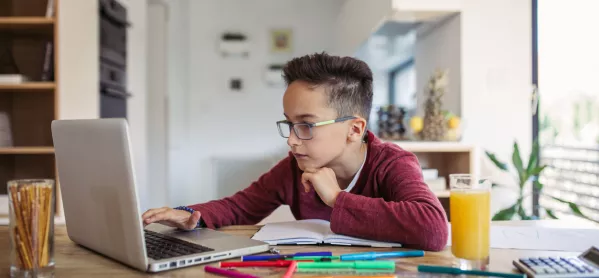Remote learning for primary and early years children does not need to be entirely screen-based, the Department for Education has clarified.
In a meeting with key stakeholders in the education sector, the DfE is understood to have told Dame Alison Peacock, head of the Chartered College of Teaching, that distance learning for younger children need not be conducted wholly online.
The Chartered College leader told Tes that “this was very definitely the direction of travel - it shouldn’t all be sitting at a screen”.
Remote learning: Live lessons are ‘best’ - Williamson contradicts Ofsted
Ofsted: How to do remote learning ‘well’
In full: Online learning - what the DfE expects of teachers
Dame Alison asked the government to clarify its position after the education secretary said on Monday that live remote lessons are the “best” form of teaching in the current lockdown, putting him in direct opposition to the view held by schools’ inspectorate Ofsted.
“To be frank, the complete kind of ‘Ofsted says one thing, DfE says another’ around this has presented some confusion,” she said.
“And, you know, we’d already weeks ago decided we needed to look at resources that would support learning that wasn’t digital.”
Asked about her conversation with the department, Dame Alison said: “I just said: ‘Can we clarify with early years children and primary children, in particular, that remote learning doesn’t always have to mean screen-based learning?’, and [the DfE] said that, of course, you know, it was important there might be times when the child is reading a book or doing all kinds of other things and it doesn’t have to be screen-based.
“And it builds on the fact that this morning I was meeting with a group of heads, who were concerned to hear this kind of call that everything should be online, and synchronous for young children. And actually what we know from really good pedagogy is that you have a varied diet of teaching and some of it is independently pursued by the child and some of it is with the teacher leading it and so on, and that varies throughout the day.
“And I just felt you know, listening to these headteachers, how relieved they were to think well actually we can do things like...set the child tasks to go and find the whole series of different objects that are polygons, or whatever they may be, and take a photograph of that, or do a picture with some leaves from the park or wherever it might be, or also just physical activity.
“So the real importance, especially for very young children of physical activity, which is, you know, rolling and running and catching and play - all those things are really important for development, it’s not just about brain-based, screen-based, and [the DfE] confirmed that that was the case.”
Pleased to receive confirmation from @educationgovuk that it is important for our younger children in particular to engage in non screen-based remote learning @CharteredColl @YouthSportTrust @Parentkind #EarlyYears #Primary #SEND
- Alison Peacock (@AlisonMPeacock) January 20, 2021
Earlier this month, the Department for Education said schools must include video content in their online learning provision.
Current government guidance states that, in developing their remote education, schools should “select a digital platform for remote education provision that will be used consistently across the school in order to allow interaction, assessment and feedback and make sure staff are trained and confident in its use”.
However it also states that, for younger children in key stage 1 or Reception, the department does “not expect that solely digital means will be used to teach these pupils remotely”.
